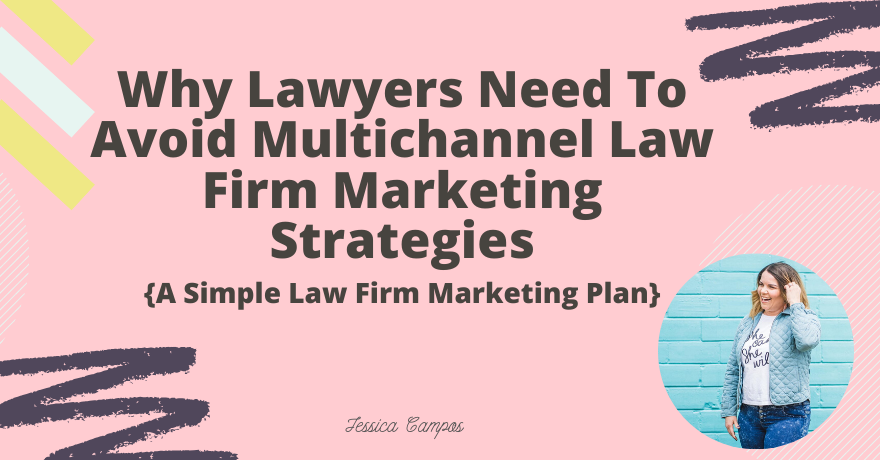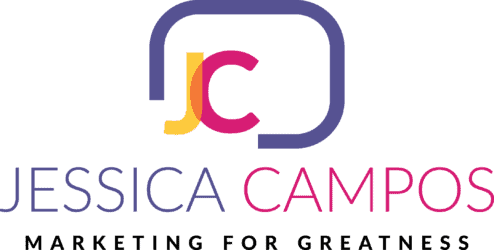Why Lawyers Need To Avoid Multichannel Law Firm Marketing Strategies
Are you looking for a law firm marketing plan that has actually been created by a lawyer who is now a digital marketing strategist? You’ve landed in the right place.
In this article, my goal is to give lawyers and law firms a legal marketing game plan that adjusts to reality. So what exactly is reality? The most successful attorneys are not successful because they rank #1 in Google. They are successful because people know about their excellent work.
Does that mean that lawyers should not use digital marketing and social media marketing? Not really. But, certainly, their online marketing needs to be done differently. Social media marketing for lawyers is different than social media marketing for e-commerce, for example.
Keep reading, because in this article you will learn all about what it takes to market yourself differently for the better.
What Is Multichannel Marketing And Why Does It Fail For Law Firms?
So, let’s start with the basics. What exactly is multichannel marketing?
Multichannel marketing is pretty much taking you back to the days when a potential client opened the yellow pages, found your office, and called to make an appointment. Think back to the dark ages…before the Internet was really even a thing.
Marketing was a static message. You needed a message for the Yellow Pages, made for people to understand. You had your brochures with another message. Then, radio commercials, TV, etc. All of that advertising was created in hopes that the user would find you in one channel and respond. So, you needed to create different messages, depending on the channel in which you would advertise in order to get those end-users to respond.
That’s essentially a multi-channel approach. However, in today’s ‘digital everything’ age, users don’t behave that way.
In most cases, potential clients will use many different channeling outlets to figure out more about your law firm before actually contacting you. This is so essential for potential clients because it gives them the power and ability to do their own research.
Your potential clients come to your office prepared. In some cases, you will find that they have done extensive research before considering to even call you in the first place! You might have several stories when your clients think they know more than you! Because they learned on Google! Right?
How can we market to meet our users’ expectations? That’s the main question! Let’s just start by agreeing with one main rule: stop following a multi-channel approach.
Here’s an example of the “old fashioned and out of date” multichannel marketing.
We see the multichannel model failing, even in other forms of advertising like:
- Paid leads
- Paid display banners
- Paid search
- Legal listings (lawyers.com, avvo.com, etc.)
- Print ads
- Etc…etc…
Lawyers Don’t Want Leads From Google Searching
Contrary to what traditional marketing agencies will tell you, the way your law firm will grow is not from the volume of website visits, calls, or emails. As a lawyer and marketer, I would not set up a marketing plan strictly focusing on quantity. I know for a fact that the best clients are the ones who were referred by existing clients. I would prefer more quality contacts.
The chances of selling to a new customer are between 5 and 20 percent, while the probability of selling to an existing customer is between 60 and 70 percent.
So, in theory, what do lawyers need to do in order to grow their law firm? Avoid marketing practices that are predicated in attracting cold traffic, and instead focus on:
- Provide excellent service.
- Engage with their community online and offline.
- Produce educational content.
- Use social media channels to nurture their community with educational content, in a way that ignites relevant conversations.
I understand that it is so tempting to pay for Adwords, pay per click, newspapers ads, magazines, etc. But it will be better if instead, you craft a marketing strategy that actually helps you to communicate with your audience and warm them up so they can get you referrals.
The Omnichannel Marketing Approach
In today’s Now Economy, consumers demand highly relevant and personalized experiences as they interact with brands on a multitude of devices. As their expectations increase, an omni-channel strategy becomes mission-critical for marketers.
Omnichannel marketing really puts the customer at the core in order to ensure a completely consistent, unified experience at every touch point as opposed to simply enabling that touch point. Multichannel means many, and omnichannel means all (the customer is literally at the center).
Think about omnichannel as a holistic approach. The user is the center of your marketing and not the other way around.
A Law Firm Marketing Plan Example
The key ingredient for building your refreshed marketing plan for your law firm (or office if you’re a solo) is to put yourself in the users’ shoes. What do they want to see? What do they want to hear?
Multi-channel marketing consists of putting words in consumers’ mouths, whereas omnichannel marketing focuses solely on listening to what the client wants then delivering.
Let’s craft a simple marketing plan that gets you clients for your law firm, following the omnichannel approach.
Take A Look Of Your Online Marketing With The Users Experience In Mind
Think about what goes on in the minds of those potential users, when they have a need and believe they need to speak to an attorney. Let’s say, a worried mom that was involved in a car accident this weekend.
- Worried mom researches online “car accident attorney near me”.
- Found law firms advertising on Google, didn’t click in any.
- Checked for the first law firm, organic, and found https://www.thevalentinelawfirm.com/. The website design is great! Clear, specific, represents trust and approachable. A great vibe!
- Didn’t click on any page from the website.
- Worried mom takes a look at the website for a few seconds and found the social media platforms. Great!
- Worried mom checks that the lawyer has videos so she can now associate a face with the name. Great!
- Additional points: Worried mom sees that some of her close friends are following this law firm. Fantastic!
This exercise should take you to identify the kind of content that your users are expecting to find when they are searching. The key to turn users into real leads is to provide them with the information they need, in a way that makes them easy to access.
Build A Content Marketing Plan Based On What Your Target User Can’t Find on Google
I’m sure you’ve considered writing a blog. However, when it comes to actually writing it, you can’t really think of topics that your users will find interesting. Who wants to read a law blog? Right?
Think about your blog as your library of resources that can facilitate conversations with your prospects.
Your content marketing doesn’t always have to be a long blog. It can be a checklist with items that are needed in case of a car accident. Or, if you’re a divorce attorney, a calculator of child support, with the appropriate disclaimers of course.
Create content based on a niche so that those users can find the information and follow you easier. You will be able to add other topics later. But now that you’re refining your content marketing plan, try to stick to a specific topic so users can identify your name with the kind of clients you want to take. Make it easy for them!
Build A Strong LinkedIn Profile (If You Haven’t Yet)
Don’t forget to add LinkedIn to the mix. Studies have shown that 92% of B2B marketers include LinkedIn in their digital marketing mix. Now, remember, to market a law firm is different than marketing for e-commerce. Your users are not expecting to see promotions. They are expecting to see real value from your social channels, including LinkedIn.
One simple goal for this platform is to get your profile to the all-star status. This impacts the number of views that your profile will get.
If you’re not sure if your profile is all-star, check on your dashboard and look at the top right. You should see the rank. Sometimes you get the all-star by just following the suggestions from LinkedIn.
I wrote a detailed article with everything you need to boost your LinkedIn profile and you can check all the details later, here.
Best Practices For A Strong LinkedIn Profile
1) Photo. No logo. Not your team. Not your office. A professional photo showing you approachable and trusted. Not sure if your photo makes the cut? Try this software! Photofeeler.
2) Your specialty. What do you do? Speak directly to your potential leads. Assume they search for you. Use common and clear words.
3) Your “summary” should be creative. Please, don’t be boring here! If you make it the exact same way as your competitors are writing their summary, nobody will be compelled to read it. Use emojis and bullet points.
4) Video! This is a great way to show your authority. Especially if you’re looking to build your authority.
5) Contact info. Most people forget to add their contact info or they hide it.
Don’t forget to add your content to your profile. For example, if you create a checklist or an article for your blog, you can add those on your LinkedIn profile via articles or media items on your profile.
As you will see below, LinkedIn will help you ignite referrals. Always keep that in mind. Give your clients reasons to share your content. If, for example, you’re participating in a conference to keep learning about something, share something thoughtful about your experience. Ignite those conversations!
Solidify Your Referral Marketing
Since we are taking an approach to online marketing that more user-centered, building authority and ultimately, building loyalty is what will pay your bills.
One word that should be on top of your head- referrals! And we are not kidding! Up to 76% of marketers are prioritizing customer loyalty over customer acquisition in 2018. (IDG)
Yes, we want to ignite your referral marketing engine.
Referral marketing is the preferred marketing source for many businesses including law firms. Business to business companies with referrals have a 70% higher conversion rate, and they report a 69% faster close time on sales.
Helping your customers become brand advocates is a smart business move no matter which way you cut it. Here’s an area where LinkedIn comes handy.
Don’t be afraid of connecting with your clients on LinkedIn. When their connections look for recommendations to hire a lawyer, your clients can easily tag your profile and you will be able to stay on top of those conversations.
Omnichannel Marketing: One User, One Voice, One Message, One Flow
Your law firm marketing should be simple. One ideal user. Craft the information that will help them build trust and loyalty. Stay in touch with them via social media, in particular, LinkedIn.
Don’t forget that what makes a law firm successful is excellent work. But if people don’t know about it, you won’t grow.
We’re currently helping clients revamp their marketing strategy. Who do you know that would benefit from great strategy? Share this article. Or if it’s you, please complete this 30 seconds assessment and we will schedule a complimentary session!

